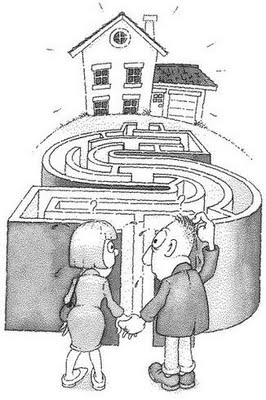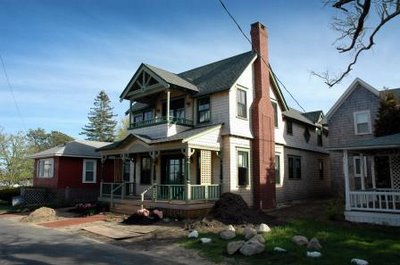IRS Rev. Proc. 2008-16 on Safe Harbor for Like-Kind Exchange of Dwelling Unit
IRC Section 1031 IRC - Section 280A Document Date: February 15, 2008
This revenue procedure is scheduled to be published in Internal Revenue Bulletin 2008-10, dated March 10, 2008.
Part III
Administrative, Procedural, and Miscellaneous
26 CFR 601.105: Examination of returns and claims for refund, credit, or abatement; determination of correct tax liability.
(Also Part 1, §§280A , 1031).
Rev. Proc. 2008-16
SECTION 1. PURPOSE
This revenue procedure provides a safe harbor under which the Internal Revenue Service (the "Service") will not challenge whether a dwelling unit qualifies as property held for productive use in a trade or business or for investment for purposes of
§ 1031 of the Internal Revenue Code. SECTION 2. BACKGROUND
.01 Section 1031(a) provides that no gain or loss is recognized on the exchange of property held for productive use in a trade or business or for investment (relinquished property) if the property is exchanged solely for property of like kind that is to be held either for productive use in a trade or business or for investment (replacement property). Under § 1.1031(a)-(1)(a)(1) of the Income Tax Regulations, property held for productive use in a trade or business may be exchanged for property held for investment, and property held for investment may be exchanged for property held for productive use in a trade or business.
.02 Rev. Rul. 59-229, 1959-2 C.B. 180, concludes that gain or loss from an exchange of personal residences may not be deferred under § 1031 because the residences are not property held for productive use in a trade or business or for investment.
.03 Section 2.05 of Rev. Proc. 2005-14, 2005-1 C.B. 528, states that § 1031 does not apply to property that is used solely as a personal residence.
.04 In Moore v. Commissioner, T.C. Memo. 2007-134, the taxpayers exchanged one lakeside vacation home for another. Neither home was ever rented. Both were used by the taxpayers only for personal purposes. The taxpayers claimed that the exchange of the homes was a like-kind exchange under § 1031 because the properties were expected to appreciate in value and thus were held for investment. The Tax Court held, however, that the properties were held for personal use and that the "mere hope or expectation that property may be sold at a gain cannot establish an investment intent if the taxpayer uses the property as a residence."
.05 In Starker v. United States, 602 F.2d 1341, 1350 (9th Cir. 1979), the Ninth Circuit held that a personal residence of a taxpayer was not eligible for exchange under § 1031, explaining that "[it] has long been the rule that use of property solely as a personal residence is antithetical to its being held for investment."
.06 The Service recognizes that many taxpayers hold dwelling units primarily for the production of current rental income, but also use the properties occasionally for personal purposes. In the interest of sound tax administration, this revenue procedure provides taxpayers with a safe harbor under which a dwelling unit will qualify as property held for productive use in a trade or business or for investment under § 1031 even though a taxpayer occasionally uses the dwelling unit for personal purposes.
SECTION 3. SCOPE
.01 In general. This revenue procedure applies to a dwelling unit, as defined in section 3.02 of this revenue procedure, that meets the qualifying use standards in section 4.02 of this revenue procedure.
.02 Dwelling unit. For purposes of this revenue procedure, a dwelling unit is real property improved with a house, apartment, condominium, or similar improvement that provides basic living accommodations including sleeping space, bathroom and cooking facilities.
SECTION 4. APPLICATION
.01 In general. The Service will not challenge whether a dwelling unit as defined in section 3.02 of this revenue procedure qualifies under § 1031 as property held for productive use in a trade or business or for investment if the qualifying use standards in section 4.02 of this revenue procedure are met for the dwelling unit.
.02 Qualifying use standards.
(1) Relinquished property. A dwelling unit that a taxpayer intends to be relinquished property in a §1031 exchange qualifies as property held for productive use in a trade or business or for investment if:
(a) The dwelling unit is owned by the taxpayer for at least 24 months immediately before the exchange (the "qualifying use period"); and
(b) Within the qualifying use period, in each of the two 12-month periods immediately preceding the exchange,
(i) The taxpayer rents the dwelling unit to another person or persons at a fair rental for 14 days or more, and
(ii) The period of the taxpayer's personal use of the dwelling unit does not exceed the greater of 14 days or 10 percent of the number of days during the 12-month period that the dwelling unit is rented at a fair rental.
For this purpose, the first 12-month period immediately preceding the exchange ends on the day before the exchange takes place (and begins 12 months prior to that day) and the second 12-month period ends on the day before the first 12-month period begins (and begins 12 months prior to that day).
(2) Replacement property. A dwelling unit that a taxpayer intends to be replacement property in a §1031 exchange qualifies as property held for productive use in a trade or business or for investment if:
(a) The dwelling unit is owned by the taxpayer for at least 24 months immediately after the exchange (the "qualifying use period"); and
(b) Within the qualifying use period, in each of the two 12-month periods immediately after the exchange,
(i) The taxpayer rents the dwelling unit to another person or persons at a fair rental for 14 days or more, and
(ii) The period of the taxpayer's personal use of the dwelling unit does not exceed the greater of 14 days or 10 percent of the number of days during the 12-month period that the dwelling unit is rented at a fair rental.
For this purpose, the first 12-month period immediately after the exchange begins on the day after the exchange takes place and the second 12-month period begins on the day after the first 12-month period ends.
.03 Personal use. For purposes of this revenue procedure, personal use of a dwelling unit occurs on any day on which a taxpayer is deemed to have used the dwelling unit for personal purposes under § 280A(d)(2) (taking into account § 280A(d)(3) but not § 280A(d)(4)).
.04 Fair rental. For purposes of this revenue procedure, whether a dwelling unit is rented at a fair rental is determined based on all of the facts and circumstances that exist when the rental agreement is entered into. All rights and obligations of the parties to the rental agreement are taken into account.
.05 Special rule for replacement property. If a taxpayer files a federal income tax return and reports a transaction as an exchange under § 1031, based on the expectation that a dwelling unit will meet the qualifying use standards in section 4.02(2) of this revenue procedure for replacement property, and subsequently determines that the dwelling unit does not meet the qualifying use standards, the taxpayer, if necessary, should file an amended return and not report the transaction as an exchange under § 1031.
.06 Limited application of safe harbor. The safe harbor provided in this revenue procedure applies only to the determination of whether a dwelling unit qualifies as property held for productive use in a trade or business or for investment under § 1031. A taxpayer utilizing the safe harbor in this revenue procedure also must satisfy all other requirements for a like-kind exchange under § 1031 and the regulations thereunder.
SECTION 5 . EFFECTIVE DATE
This revenue procedure is effective for exchanges of dwelling units occurring on or after March 10, 2008. No inference is intended with respect to the federal income tax treatment of exchanges of dwelling units occurring prior to the effective date of this revenue procedure.
SECTION 6 . DRAFTING INFORMATION
The principal author of this revenue procedure is J. Peter Baumgarten of the Office of Associate Chief Counsel (Income Tax & Accounting). For further information regarding this revenue procedure contact Mr. Baumgarten at (202) 622-4920 (not a toll free call).
Labels: 1031 Tax Deferred Exchange, EXCLUSIVE Buyer Agency, Martha's Vineyard Real Estate, second-home, Selling Real Estate, vacation home

-1a-741716.jpg)


